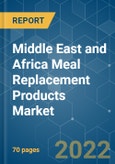The Middle East and Africa Meal replacement products market is projected to witness a CAGR of 6.45% during the forecast period (2020 - 2025).
Key Highlights
- The South African meal replacement market is driven by the robust popularity of the weight management products among health-conscious consumers. The marketplace has also experienced an increase in the launch activity of health-promoting snack bars, which are condition-specific and portion-controlled thus, driving the market forward.
- Moroever, the focus on healthy eating habits, pertaining to the fitness trends without compromising the taste benefits, has also led to the growth of meal replacement market in the United Arab Emirates. Products, like weight management bars, are slowly replacing traditional chocolate and confectionery as a healthier alternative, due to high product innovation by the existing players.
Key Market Trends
Inclination Towards Nutrition Bar Marketed as Meal Replacement Bars is on the Rise
With increasing awareness about a healthy diet among the both the resident and expat population residing in the Middle East and Africa region, the nutritional bars have become immensely popular, replacing chocolates, cakes, and biscuits as convenient options to the consumers. Key brands such as Zero Bar operating in the market studied are continuously differentiating their products in terms of providing full nutritional appetite, flavors, ingredients, size, and packaging, in order to gain competitive advantage.
Initially, the nutrition bars were classified as a niche category, designed particularly for sports and athletes' personnel. But with the rising demand for nutritional snacking and changing preference for snack and energy bars therefore, the nutritional bars, are increasingly being marketed as meal replacement products, which is expected to fuel the market for these products in the Middle East and Africa, over the forecast period.
The Increasing Consumption of Meal Replacement Products in United Arab Emirates
The meal replacement market in United Arabia Emirates has been growing over the years in the country, owing to the strong youth population and perception of a protein food as a substitute for other healthy food because of high nutrition content.
The UAE government is developing numerous health initiatives, which is thereby increasing the awareness of those products pertaining to weight management and nutritous diet, as these products have health benefits, which directly control both obesity and diabetes. Therefore, this factor is expected to increase the demand for the meal replacement products in United Arab Emirates.
Furthermore, UAE consumers are looking for real food ingredients, such as whole grains, fruits, nuts, and vegetables, like carrot, with zero added sugars, less artificial sweeteners, and hydrogenated fats, in the meal-replacing products thus, driving the market further.
Competitive Landscape
The most active companies in the Middle East and Africa Meal replacement products market are Nestle SA, Organo Gold Africa (Pty) Ltd., Evolve Nutrition, and others. The prominent players operating in the market are focusing on new product developments, expansions, partnerships, and mergers and acquisitions, as strategies to cater to the increasing demands of the consumers in the region, thereby, gaining a competitive advantage in the meal replacement products market.
Companies selling their products in the market are launching the products which have the following properties such as free from soy, free from dairy or dairy-derived ingredients, free from MSG, free from artificial colors and others, so as to induce customers to purchase more of these meal replace products in the region studied.
Additional Benefits:
- The market estimate (ME) sheet in Excel format
- 3 months of analyst support
This product will be delivered within 2 business days.
Table of Contents
Companies Mentioned (Partial List)
A selection of companies mentioned in this report includes, but is not limited to:
- Abbott Laboratories
- The Hut.com Limited (Myprotein)
- Organo Gold Africa (Pty) Ltd.
- Mannatech, Incorporated
- Evolve Nutrition
- Nutritech
- Futurelife
- Nestle SA








